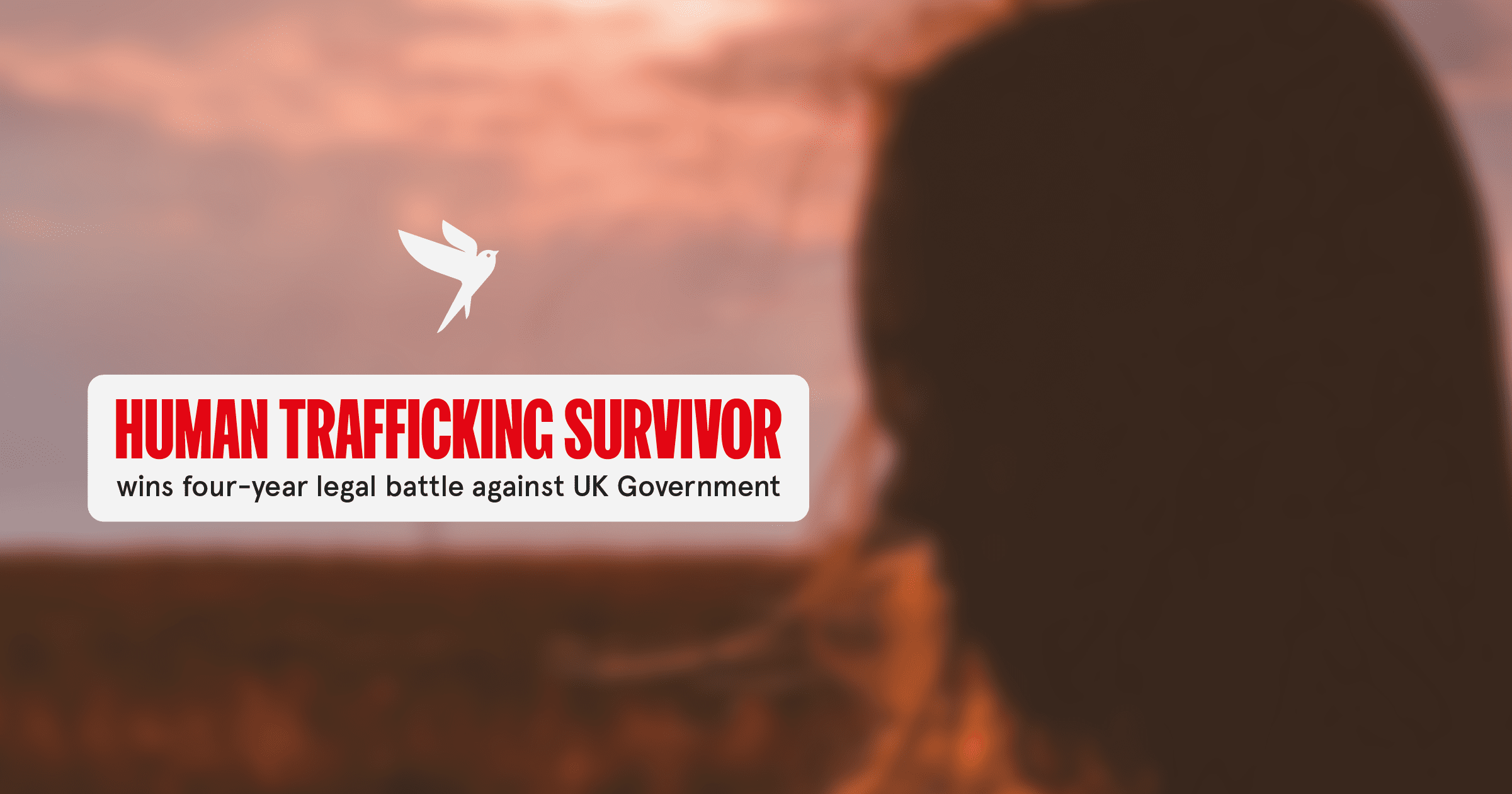Home Office unlawfully detains survivor of sexual exploitation
Hope for Justice is a charity working to bring an end to modern slavery and human trafficking, and to protect the human rights of victims and survivors.
They are active in the United Kingdom, United States, Cambodia, Norway, Australia, Ethiopia and Uganda.
Their multi-disciplinary model is based on four pillars: preventing exploitation; rescuing victims; restoring lives; and reforming society.
The post Home Office unlawfully detains survivor of sexual exploitation first appeared on Hope for Justice.
A female survivor of modern slavery has had her deportation order quashed and has been awarded compensation after being illegally held in a detention centre for three months.
The UK Home Office has been forced to pay £20,000 in damages to the survivor after the courts ruled that she was unlawfully detained. They settled the case out of court.
Lena*, who is in her 30s, has also been threatened with deportation and faced uncertainty over her immigration case for almost four years despite being formally identified as a victim of modern slavery in the UK – through the Home Office's own process, the National Referral Mechanism (NRM). The Upper Tribunal recently upheld a decision to revoke the deportation order after a four-year legal battle.
Lena told Hope for Justice: “It has been a long four years but now I feel so much better. During that time, I had lots of anxiety and panic attacks. I was always thinking that it was a negative response from the Home Office towards me. I never thought I could stay in the UK.”
Lena was just 16 when she was trafficked from the Czech Republic to London and forced into prostitution. She was groomed to become part of the sex industry. During this time, her traffickers forced her to commit a number of crimes, including managing a brothel.
Lena now has a criminal record, with a number of unjust criminal convictions in her name linked to her exploitation. Lena was handed a two-year prison sentence in 2017. On leaving prison, the Home Office issued her with a deportation order in relation to her convictions and she was moved to a detention centre. Lena was held unlawfully for three months until her release in early 2019.
We learned that, prior to her sentencing, Lena was appointed a duty criminal advisor who told her she was not a victim of modern slavery and incorrectly advised her to plead guilty. While in prison, Lena disclosed what had happened to her to a charity worker, resulting in her referral into the NRM.
In 2019, Lena received a positive ‘conclusive grounds' decision via the NRM, formally identifying her as a victim of modern slavery. This entitled her to support such as accommodation, subsistence, legal aid and counselling.
Despite Lena having received an initial positive ‘reasonable grounds' decision followed by a positive conclusive grounds decision via the NRM, and despite official guidance stating that potential victims should not usually be imprisoned, the department maintained her detention.
Home Office guidance states: “Where a positive reasonable grounds decision is received, the individual will enter into a minimum 45-day recovery period, except where public order grounds prevent it, where the potential victim is protected from removal or deportation from the United Kingdom. Caseworkers must review detention on receipt of a positive reasonable grounds decision and make a decision on the appropriateness of ongoing detention in light of this information.”
The Single Competent Authority (SCA) – a part of the Home Office – identified Lena as a victim of modern slavery, however they only considered she was a victim of sexual exploitation and did not include the period of time when she was compelled to commit offences.
Lena was finally released on bail in early 2019 after she had already spent months in the detention centre.
She was referred to Hope for Justice in 2019, and since then, we have been supporting her with her immigration case.
Ellie Russell, Advocacy Manager, said: “At the time we met Lena, she had no contact with her previous immigration solicitor and was terrified at the thought of being deported to her home country, where the only people she knew were the family members who had trafficked her in the first place.”
When we started supporting Lena, she had already been issued with a decision from the Home Office that they intended to deport her. Hope for Justice supported Lena to access immigration advice and one year later, she had her first appeal.
Lena appealed the decision twice, the second time to the Upper Tribunal, but was unsuccessful. Hope for Justice subsequently referred her to the AIRE Centre, which specialises in European national cases. They challenged the deportation order on the grounds that Lena had not been removed within two years, which meant she could submit another request to have the order revoked. This request was also refused.
Lena appealed this refusal and her appeal was heard before the Immigration Tribunal earlier this year and was successful. We provided written and verbal evidence for the appeal, which was quoted in the judgement and described as “persuasive”. The tribunal judge allowed the appeal and agreed that the deportation order should be revoked.
Just one week after this decision, the Home Office sought permission to appeal the decision. The case returned to the Upper Tribunal, however the judge denied the appeal and upheld the original decision.
After nearly four years, the case was finally closed. Lena had been through four appeals and one request for the deportation order against her to be revoked before seeing resolution.

Lena said: “I felt so much more confident because of the help I received from Hope for Justice and the AIRE Centre. I felt more secure and not as scared. I was able to trust you.
“If I didn't get this help, I don't know where I would be now or what would have happened. I don't believe I would be where I am without you. All I can say is I am forever thankful. I have experienced so much at the hands of the Home Office but now it is over and done.”
The AIRE Centre commended Lena for her “huge resilience” throughout the legal proceedings.
Matthew Evans, Director at the AIRE Centre, said: “We were really pleased to be able to offer legal support in this case. The client was unrepresented when she was first considered for deportation. After two years, the Home Office had still not taken any action to remove her and so we were able to get her a new hearing. By this time she had a new partner, was pregnant and had been working and living in the UK without any issues. At the hearing, the client was supported by Hope for Justice, and the Judge found clear evidence that her removal would serve no public interest and, given the lack of risk she posed, would be disproportionate. The client, whose mental state had suffered as a result of her experiences in the UK, showed huge resilience throughout the proceedings. After her deportation case was dealt with we were then able to support her to progress and get settled status.”
Hope for Justice has also been supporting Lena in relation to her criminal convictions. Although she was recognised as a victim of sexual exploitation, the SCA did not accept that she was a victim of criminal exploitation.
When a public law solicitor was instructed to handle Lena's compensation claim for false imprisonment, we also sought their advice on her convictions. They took on this case as well and submitted detailed representations to the SCA asking them to review the decision. About one month ago, we received the positive news that Lena is recognised as a victim of modern slavery for the entire period of time covering her exploitation and criminal convictions.
Ellie Russell said: “Finally, seven years after leaving her exploitation, this female survivor is formally recognised by a government agency as being a victim of modern slavery for her entire period of exploitation. This is certainly affirmation for her. Lena was technically free from exploitation in 2015 but she would only say now that she is able to move forward.”
Ellie continued: “Sadly, because of the uncertainty around her immigration status and the anxiety this has caused her, Lena has been unable to receive counselling. Her therapist acknowledged that the ongoing distress she was facing meant they could not even begin to process the trauma from her trafficking. The Home Office's unjust treatment of this survivor, resulting in her being without stability, as well as the mental and emotional turmoil it has created, has significantly delayed Lena's ability to recover. Despite everything she has been through, Lena remains hopeful.
“Lena has shown incredible resilience as she has faced each of these legal battles. She is very independent and settled within her community.”
Ellie Russell, Advocacy Manager
Lena is currently considering whether to receive further legal advice around her criminal convictions in light of the recent SCA decision.
Lena has a young family and told us that she wants to “focus on the future”, to move forward with her life.
She said: “I would like have my own home one day and focus on my family and children. I can't believe how far we have come. I want to focus on the good and positive things and move on and learn from the past and appreciate what I have.”
*Name and image changed to protect identity of the survivor

Guardians are regular givers who support us as we help survivors of modern slavery to rebuild their lives.
This “Eyes on Trafficking” story is reprinted from its original online location.
 ABOUT PBJ LEARNING
ABOUT PBJ LEARNING
PBJ Learning is a leading provider of online human trafficking training, focusing on awareness and prevention education. Their interactive Human Trafficking Essentials online course is used worldwide to educate professionals and individuals how to recognize human trafficking and how to respond to potential victims. Learn on any web browser (even your mobile phone) at any time.
More stories like this can be found in your PBJ Learning Knowledge Vault.
EYES ON TRAFFICKING
This “Eyes on Trafficking” story is reprinted from its original online location.
ABOUT PBJ LEARNING
PBJ Learning is a leading provider of online human trafficking training, focusing on awareness and prevention education. Their interactive Human Trafficking Essentials online course is used worldwide to educate professionals and individuals how to recognize human trafficking and how to respond to potential victims. Learn on any web browser (even your mobile phone) at any time.
More stories like this can be found in your PBJ Learning Knowledge Vault.

